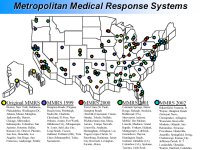Metropolitan Medical Response System (MMRS)
A Metropolitan Medical Response System (MMRS) is an operational system at the local level to respond to a terrorist incident and other public health emergencies that create mass casualties or casualties requiring unique care capabilities. The MMRS Program was created in 1996, in response to the Tokyo mass transit Sarin gas attack by Aum Shinrikyo and the domestic terrorist bombing of the Alfred P. Murrah Building in Oklahoma City, both having occurred in 1995.
This system enables a Metropolitan Area to manage the event until State or Federal response resources are mobilized. The MMRS program assists highly populated jurisdictions to develop plans, conduct training and exercises, and acquire pharmaceuticals and personal protective equipment, to achieve the enhanced capability necessary to respond to a mass casualty event caused by a WMD terrorist act. This assistance supports the jurisdictions' activities to increase their response capabilities during the first hours crucial to lifesaving and population protection, with their own resources, until significant external assistance can arrive.
Gaining these capabilities also increases the preparedness of the jurisdictions for a mass casualty event caused by an incident involving hazardous materials, an epidemic disease outbreak, or a natural disaster. MMRS fosters an integrated, coordinated approach to medical response planning and operations, as well as medical incident management at the local level.
MMRS is a locally developed, owned, and operated mass casualty response system.An enhanced local health and medical response to victims of terrorist incidents and other public health emergencies.
MRC units are a key source for volunteers and have the capability to provide assistance in the MMRS focus areas to support a mass casualty event. Therefore, MMRS jurisdictions are encouraged to establish and support MRC units that are within their areas. As of FY06, local MRC units can receive funding of up to $25,000 per MMRS jurisdiction.
MMRS Characteristics include:
- Integrated medical response system
- Detailed system response & operations plans
- Specially trained responders at all levels
- Specialized response equipment
- Specialized medical equipment and pharmaceutical cache
- Enhanced medical transport and treatment capabilities
MMRS has 12 MMRS Capability Focus Areas, which include the following:
- Strengthen Medical Surge
- Strengthen Mass Prophylaxis
- Strengthen CBRNE Detection, Response, and Decontamination Capabilities
- Strengthen Interoperable Communication Capabilities
- Strengthen Information Sharing and Collaboration Capabilities
- Expand Regional Collaboration
- Triage and Pre-Hospital Treatment
- Medical Supplies Management and Distribution
- Mass Care (Sheltering, Feeding, and Related Services)
- Emergency Public Information and Warning
- Fatality Management
- Volunteer Management and Donations
|
NEWSLETTER
|
| Join the GlobalSecurity.org mailing list |
|
|
|


